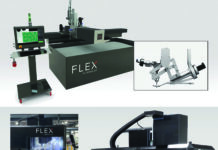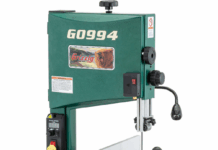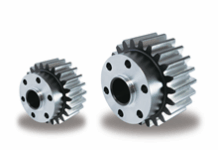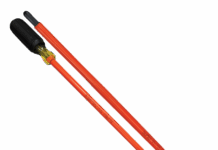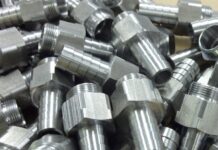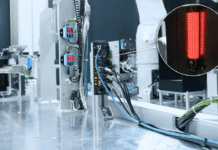
The decade began with a semiconductor shortage that made the world acutely aware of how critical these tiny components are in many aspects of everyday life and for most sectors of the economy. Demand for semiconductors skyrocketed driven by a pandemic-led rise in remote work, distance learning, gaming, entertainment, internet shopping, data analytics, and soaring sales of vehicles, and will continue to grow, doubling the global chip market to over $1 trillion by 2030.
Keeping up with this demand, however, has been complicated by a different shortage — the limited availability of small but critical components required by the chip fabrication process: chip fabrication processes depend on the FFKM (perfluoroelastomer) O-rings, gaskets, and other seals that can stand up to the extremely high temperatures and aggressive chemicals while controlling particulate excursions that cause contamination.
Unsurprisingly, this has triggered an even higher demand for FFKM seals already popular in the semiconductor industry. While most manufacturers are expanding capacity as quickly as possible, demand continues to outpace supply – further increasing the need for FFKM materials and leading to shortages. The current global shortage of FFKM is caused by limitations in the supply of raw materials occurring at the same time as the acceleration in demand for FFKM products.
Causes of the global supply shortages
First let’s look at the supply constraints. The global supply of raw material feedstocks necessary for FFKM production has been severely limited by two factors — environmental restrictions and geo-political events.
Increasing environmental restrictions
Environmental and regulatory agencies around the world have been tightening regulations on several industrial products and manufacturing processes around the world that directly impact FFKM production.
Restrictions on per- and poly-fluoroalkyl substances (PFAS), with more complex and stringent regulations, have been squeezing availability for several years. Some of the FFKM suppliers have either had plants shut down or lines interrupted by regulators. In response, PFAS suppliers for FFKM production are in midst of multi-year processes of engineering fluorosurfactants out of their manufacturing processes.
Tetrafluoroethylene (TFE) a fluorocarbon with the chemical formula C2F4 is a raw material used in all FFKM. It is extremely dangerous to handle. Therefore, the time-consuming process of engineering, siting, and permitting makes it difficult for existing facilities to expand capacity and poses very barriers to entry for new facilities.
Geopolitical situation
In 2022, the Russia-Ukraine conflict has exacerbated supply shortages. FFKM formulations are extremely unique and require a multitude of specific chemistries working in unison to create the final formulation. Some of those unique chemistries are constrained due to the technologies only being available in areas impacted by the Russia-Ukraine conflict..
Chemraz® FFKM seals
- Superior Performance
- Minimal metallic ion content
- Exceptional plasma resistance
- Low particle generation
- High dimensional stability
- Operational Benefits
- Superior reliability
- Enhanced repeatability
- Maximum system uptime
- Lower cost of ownership
What is driving the demand for FFKM in semiconductor fabrication?
As chipmakers pack in more and tinier transistors in their chips, they are turning to more demanding manufacturing processes that rely on ultraclean processing. They need seal materials with excellent chemical stability and high heat tolerance. The chemical properties of FFKM make it ideal for many demanding sealing applications in semiconductor fabrication, as its name “perfluoroelastomer” describes:
elastomer — a synthetic rubber characterized by elastic properties. Elastomers are built upon long chains of carbon-carbon polymer with crosslinks that serve as a backbone that provides the elasticity (recovery from deformation) that provide durable, effective mechanical seals (in contrast to PTFE, which lacks elasticity). However, the long chains and crosslinks that connect elastomers can break down under extreme temperatures and pressures and chemical attacks.
fluoroelastomer — Therefore, the carbon backbone is surrounded by relatively large fluorine atoms, creating a robust shielding effect against chemical attack. The carbon-fluorine bond is the most stable in organic chemistry resulting in extreme resistance to high temperatures and pressures.
perfluoroelastomer — The “per” prefix means “fully” fluorinated, for the highest level of temperature and chemical performance in the fluoroelastomer family. At a fluorination level of 73%, perfluoroelastomer (FFKM) provides higher temperature and chemical resistance than fluoroelastomer (FKM) which has a fluorination level of 66-70%. The fully fluorinated FFKM takes advantage of the strong carbon-fluorine bond (approximate bond energy of 105 Kcal/m), compared to the carbon-hydrogen bonds (approximately 80 Kcal/m) present in FKM and other elastomers.
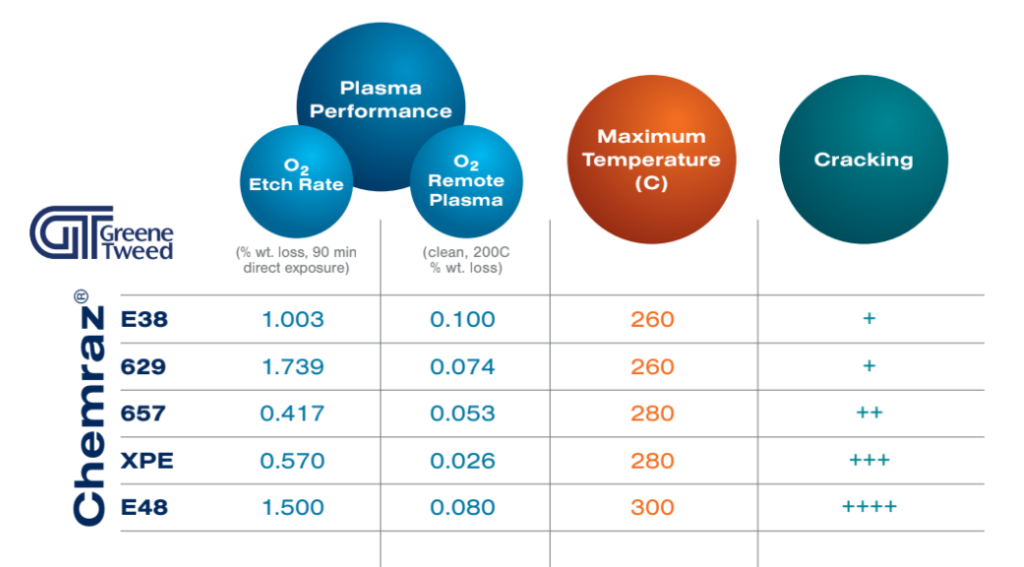
Superior performance for the most demanding fabrication methods
Combining the broad, almost universal chemical resistance of PTFE with the resilience of elastomers, FFKM seals are found throughout a broad range of mission-critical equipment in key process areas of the world’s semiconductor fabs, including etch, deposition, aqueous, and electro-chemical (electroplating).
As the first in the nation to use cleanroom manufacturing, Greene Tweed has continually evolved to meet the rapidly changing needs of the semiconductor industry. Greene Tweed’s line of Chemraz® FFKM seals, feature the highest chemical compatibility and temperature resistance of all elastomers, up to 615°F/324°C and are designed to withstand the latest plasmas used in cutting-edge deposition and etch wafer process operations. Our range of integrated solutions leverages bonding, encapsulation, and coating capabilities to provide extra protection for critical components.
These FFKM integrated sealing solutions boost productivity while reducing contamination and maintenance expenses. By extending MTBR (mean time between repair), FFKM seals reduce costly unplanned downtime and the associated production losses, safety hazards, and environmental degradation.
Broad spectrum of FFKM solutions tailored to each application
These sealing solutions have continually advanced to resist the harsh plasmas and chemicals found in the latest methods of wafer cleaning, patterning, deposition, and various other wafer fabrication processes.
Rapid Development of New Compounds
 The Elastomer Center of Excellence located at the Greene Tweed Advanced Technology Group Headquarters in Kulpsville, PA, is dedicated to the advancement of new elastomer compounds and offers complete integration of processes – from initial raw material mixing and development to prototype product packaging. The Center brings speed, efficiency, and agility that accelerates the pace of new semiconductor compound development.
The Elastomer Center of Excellence located at the Greene Tweed Advanced Technology Group Headquarters in Kulpsville, PA, is dedicated to the advancement of new elastomer compounds and offers complete integration of processes – from initial raw material mixing and development to prototype product packaging. The Center brings speed, efficiency, and agility that accelerates the pace of new semiconductor compound development.
The Center contains a large all-inclusive cleanroom environment to deliver the industry’s most advanced perfluoroelastomers that meet stringent quality and cleanliness requirements The process systems feature some of the highest industry lab standards and include mixing mills/internal mixers, extruders, press systems, post-cure ovens, inspection systems, and a cleaning and packaging area. In addition, the Center can conduct application-specific exposure experiments with plasma etch systems and UV/ozone systems and extensive testing capability for composition/morphology and material properties.
Rapid Development of New Product to Mitigate the FFKM Shortage
This new product development capability has also positioned Greene Tweed to lead the market in the rapid introduction of new FFKM products that replace ingredients that are supply constrained with more readily available feedstock materials.
This year, the Center has prioritized its work to focus almost exclusively on developing substitutes for supply-constrained Chemraz products that our semiconductor customers have identified as most critical to their operations.
These new formulations are subjected to rigorous testing to ensure that they meet the extreme thermal and chemical resistance requirements of demanding semiconductor fabrication applications without causing harmful particulation.
The first replacements to be released will be materials equivalent to Chemraz 657 and Chemraz E38, for dry plasma and O2 plasma etching processes requiring minimal contamination. These new product offerings will be available for testing on a limited basis in late 2022 and generally available in mid 2023.
Greene Tweed application engineers will also continue to work with semiconductor customers to identify existing Greene Tweed products that can serve as substitutes for FFKM products that have limited availability and will continue to utilize the Center’s capabilities to rapidly create samples for testing and verification of the customer’s sealing application.
Future Outlook
The Global FFKM shortage will continue well into 2023. Throughout the remainder of 2022 and into 2023, Greene Tweed will continue to launch new materials aimed at achieving performance equivalency but with a more robust supply chain.
The global supply shortage of FFKM raw material feedstock is expected to ease during the first half of 2023, with an expected increase in feedstock asset capacity during 2024-2025.
By Nick McNeal, Director Semiconductor Strategy, Greene Tweed and Thyag Sadasiwan, Director Chemraz®, Greene Tweed










